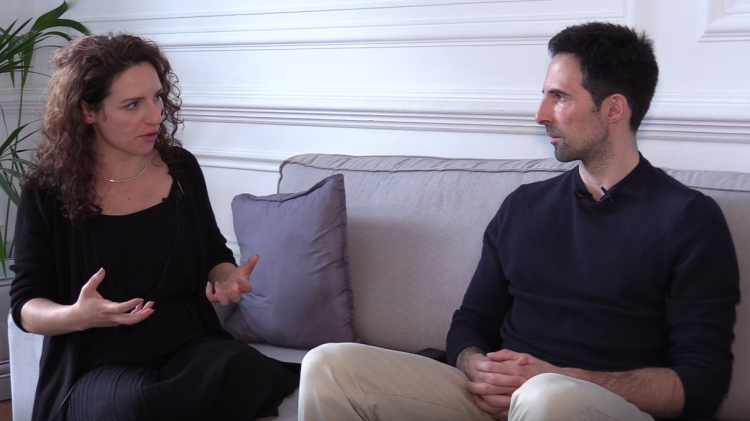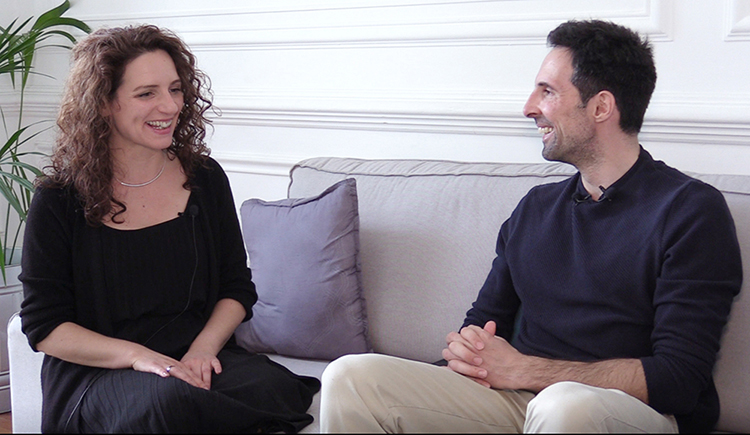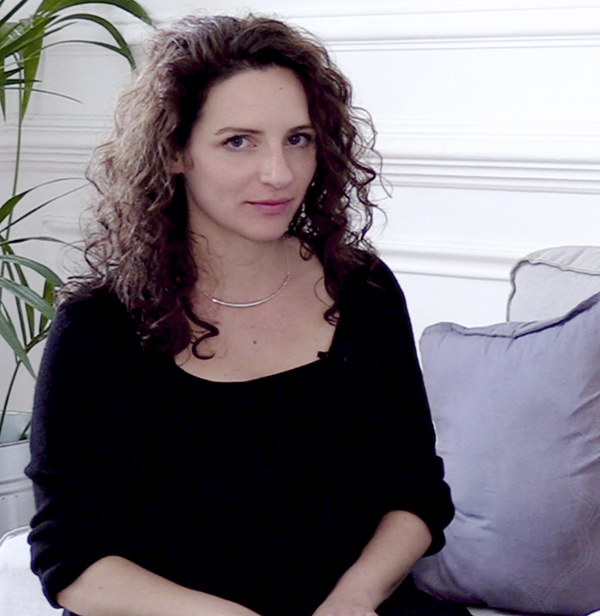Catarina Santos Nunes is the founder of Espaço 3D Cowork, a coworking space in downtown Lisbon. They call themselves “an eclectic community of inspired entrepreneurs who created a fun, laid back and creative worksplace in the heart of Lisbon.” They have 18 private offices, 20 open spaces, and host 36 events annually.
In this interview, Catarina shares a little bit about her background, her view about the coworking industry, her business unique value proposition, some business tips, the importance of the community for creating a coworking space, and she also shares a good piece of advice with young entrepreneurs.

Miguel Salvado: Tell us a little bit about your background.
Catarina Santos Nunes: I graduated in engineering and law. I was responsible for the legal department of an edge fund for six years. After that, I started doing something completely different and I created my legal startup five years ago. While doing that, the chance of acquiring this space (3D workspace) appeared and I was challenged by the founders of the space. it was a very small setup with only ten residents and it wasn’t performing very well, so we had to buy their debt, create a whole new community and focus on specific services.
We’ve been here for around three years. Since then, we managed to make the company grow five hundred percent compared to what it was before but mostly the community, which is the interesting part here.
Why did you go to this space? What’s unique about it?
Back in the day when we started this, I brought my startup here in the beginning. I fell in love with the building. First, it’s a historical building with 110 years old, it’s the only building in Lisbon with this setting. It has wonderful architecture and amazing light. I felt ashamed of allowing such a space to die on its own without having any fight to put into it to save it. It was either, I do something creative for the people and enjoying this wonderful space, or I just allow it to go down. It was a no-brainer, I knew I had to do this. This space is amazing and we started with something very small and it grew to the point that now we’re having a community of 110 people permanently on the office daily.
Who is coming to work here?
We have a quite diverse setting. we have people from tech, creative industries, we have some of the most interesting companies within the startup scene coming and going every time, and we have some partnerships with corporates. Consultancy businesses sent their small teams to learn how startups work. We work more like an incubator than a coworking space. We offer legal consultancy, accountancy support, management support, and we have an interesting technical team that can provide support to interesting startups.
While some focus on growing their businesses by showing off and making a lot of noise with marketing, we’re more focused into creating value, grow businesses at a faster pace and without the lights, the showbiz, and all of that.

And how did you go about bringing them here?
I think it’s mostly work done, we don’t do advertisements at all, we don’t have online marketing we’re on Google of course but we don’t have our website finished, we don’t advertise anything it’s mostly someone who knows somebody who was here. Word of mouth, or people that know me or at some point worked with me that have our work as a reference or one of the team members and just comes here and ends up staying, so it’s actually very informal but it’s also very private.
How’s the coworking industry in Lisbon going?
Well co-working has been growing quite a lot but instead of being the small pulverized market that we saw in the beginning, with the smaller coworking spaces and a lot of things that opened around the downtown area, it feels that most of those spaces that weren’t sustainable as standalone spaces because they have very small communities, things tend to aggregate a bit more and spaces are growing. So, instead of having 30 or 40 different smaller spaces, the ones that are smaller and less sustainable tend to disappear, and people are aggregating more surrounding spaces that are similar to competitive centers or centers for companies instead of being the general coworking.
I think that the tendency is happening as well because bigger companies are understanding the value of learning how do startups work. Most companies like the ones we had in here that are bigger, improve a lot by learning how startups have their internal processes, scale it on teams are usually more diversify the level of skills is different as well so by combining that with the corporate world they can improve a lot and develop a lot, so by that I think the coworking industry is being influenced as well so we saw second home opening in near the river area it’s their opening a second space, same thing with Coworking Central. It’s happening through a lot of coworking spaces, things tend to get bigger and smaller ones to disappear.
Walk us through a snapshot of the Lisbon coworking industry five years ago, now, and five years in the future?
Five years ago, we started around three years ago even though the space did not exist before there were a lot of different players in the market. It was more focused on a different kind of coworking, more nomadic people coming over and it wasn’t something like a startup community. Then, with people coming to Portugal and actually bringing their companies over, it started being more sustainable so instead of having people come in and going all the time.
Coworking started being something of a community-based thing, so there’s a lot of foreign companies coming over, people usually allocate themselves to specific places and they create their businesses, their teams, and their structures. I would say that’s what’s happening currently instead of being the nomadic people that came for tourism and for knowing Lisbon because it was the hype of the moment.
Now, people stay here and they’re looking for human capital because we have a lot of people with higher training, very skilled professionals that then actually have a market before. With the startups coming, they started realizing that on a human resources level we are great.
That brings companies in and gives them a chance of creating a permanent structure in Lisbon. I think the future is going to be very influenced by that as well. Even though the startup scene is a bit of a foam world, there’s a lot of foam on the surface and the really good things, the unicorns are at the bottom of it. So a lot of foam is going to disappear, which means that smaller settings and smaller coworking spaces with less sustainable businesses are probably going to disappear but they’re really good ones, that bring value into the coworking scene, into the startup scene, to the economy are going to stay.
Instead of being smaller structures they’re going to grow out very organically and that’s what’s happening in Lisbon. Currently, we have people coming, building their lives here, building families, building companies, and really creating something of worth, that’s sustainable, that’s robust. That’s the normal development of any sort of business, it’s not specific to coworking, even though coworking and startups are maybe faster in pace.
What are the entrepreneurial challenges you’ve been facing here?
They were a lot. First, when we got the building for ourselves, we had a 110-year-old building with no maintenance. so we had to bootstrap everything, from painting walls to fixing windows, we learn how to do everything and we did it ourselves. We didn’t have any external investment or any funding, it was everything done with our means so that was difficult.
It’s difficult to choose communities as well, for having a setup that allows people to feel comfortable and secure in an environment where they can build their businesses without having to worry about anything.
We need to do community management and that’s not having great events, thinking about awesome workshops, it’s not just that. It’s having a structure that allows people to live without noticing what’s going on the background and everything needs to run. It’s difficult to tell clients that are residents what they have or what they have not to do, so it’s a different way of exerting management on people.
I’m managing 110 people that are not my employees, they’re my clients but I still need to manage the community as if they were my own company. Besides, all the other problems, finding human resources, building an awesome technical team, developing other projects and we have several that are way beyond just co-working. it’s very challenging, it’s also very interesting doing so and we learn a lot about this I was talking to a co-founder of start-up a couple of days ago and we were discussing the ability and the skill set that we develop just by working in this scene.
Being a cowork founder and trying to bring projects to the coworking space and specifically with the incubation method that we have as well allows us to work in basically everything. We have to become experts in a bit of everything so from management, to marketing, to community building, to accountancy, to legal so there’s a lot of areas and there’s a very diverse skill set that we can develop here and that in itself is a challenge.
Please share a good piece of advice with young entrepreneurs
For coworking, seeing research the other companies that are there, the people that we surround ourselves with is paramount to our development.
An entrepreneur specifically business-oriented approach, it’s better to take a risk and fail than just waiting for something to happen at some point. If I was staying in my level of comfort and my area of knowledge, I would have studied engineering and then law and I wouldn’t have done anything,
I was questioned, specifically by my family and my close ones, about what I was doing in my life because it was unusual for someone from the banking industry, from science, and law and then quitting everything and opening a business and losing the benefits of life that I had. Nevertheless, it was an amazing challenge and I would say I wouldn’t be the same person if I hadn’t done it, so if you have a chance to take a risk do so.

